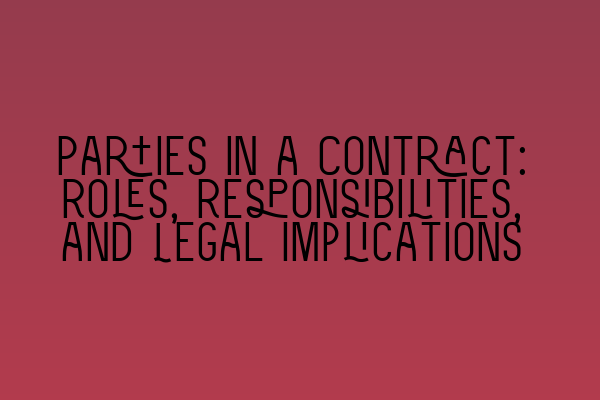Parties in a Contract: Roles, Responsibilities, and Legal Implications
When entering into a contract, it is crucial to understand the roles and responsibilities of all parties involved. Contracts play a fundamental role in business transactions and personal agreements, ensuring that the rights and obligations of each party are clearly defined and protected by law.
In this article, we will explore the various parties that may be involved in a contract, their roles and responsibilities, and the legal implications that come with their involvement.
The Parties in a Contract
A contract typically involves two or more parties, each with distinct roles and responsibilities. Let’s take a closer look at these parties:
1. Offeror
The offeror is the party who initiates the contract by making an offer to another party. This offer can be in the form of a proposal, a promise, or any other expression of intent to be bound by specific terms and conditions. The offeror must ensure that the offer is clear, definite, and communicated to the offeree.
2. Offeree
The offeree is the party to whom the offer is made. They have the power to accept, decline, or negotiate the terms of the offer. It is essential for the offeree to carefully assess the terms of the offer and ensure that they fully understand the rights and obligations associated with accepting the offer.
3. Promisor
If the offer is accepted, the offeror becomes the promisor. The promisor is the party who makes a promise or undertakes an obligation to perform certain actions or provide specific goods or services. They are legally bound to fulfill their obligations as stated in the contract. It is crucial for the promisor to perform their obligations in a timely and satisfactory manner.
4. Promisee
The promisee is the party to whom the promise is made. They have the right to expect the promisor to fulfill their obligations as agreed upon in the contract. If the promisor fails to perform their obligations, the promisee may have legal remedies available to them, such as seeking damages or specific performance.
Key Responsibilities of the Parties
Each party in a contract has specific responsibilities that they must fulfill. Let’s discuss the key responsibilities of each party:
1. Offeror’s Responsibilities
The offeror must ensure that the offer is clear, definite, and communicated effectively to the offeree. They have the responsibility to accurately represent the terms and conditions of the offer and to refrain from making fraudulent or misleading statements.
2. Offeree’s Responsibilities
The offeree must carefully review the terms of the offer and assess their rights and obligations if they accept. They have the responsibility to respond to the offer in a timely manner, either by accepting, declining, or negotiating the terms.
3. Promisor’s Responsibilities
The promisor has the primary responsibility to perform their obligations as outlined in the contract. They must deliver goods or services as agreed upon, meet deadlines, and ensure the quality and compliance of their deliverables. The promisor must also notify the promisee in case of any changes or delays that may affect the performance of the contract.
4. Promisee’s Responsibilities
The promisee’s main responsibility is to provide any necessary cooperation or support to the promisor to fulfill their obligations. They must also pay any agreed-upon consideration or fees in a timely manner and provide accurate information when required.
Legal Implications of Contracts
Contracts have legal implications that all parties should be aware of. If any party fails to fulfill their obligations, it may result in legal consequences. Here are some possible legal implications:
1. Breach of Contract
If any party fails to perform their obligations as stated in the contract, it is considered a breach of contract. The non-breaching party may have the right to sue for damages, specific performance, or other remedies as specified in the contract or under applicable law.
2. Enforceability of Contracts
Contracts must meet certain legal requirements to be enforceable. These requirements include offer and acceptance, consideration, intention to create legal relations, and legality of the contract’s subject matter. If any of these elements are missing or invalid, the contract may not be enforceable.
3. Dispute Resolution
If a dispute arises between the parties, the contract may specify a method of dispute resolution, such as arbitration or mediation. These alternative methods of resolving conflicts can help parties avoid lengthy and costly litigation.
In conclusion, understanding the roles, responsibilities, and legal implications of the parties involved in a contract is essential for successful business transactions and personal agreements. Whether you are an offeror, offeree, promisor, or promisee, it is crucial to fulfill your obligations and seek legal advice if any issues or disputes arise.
For more information on contract law and preparing for the SQE exams, you can explore the following related articles:
